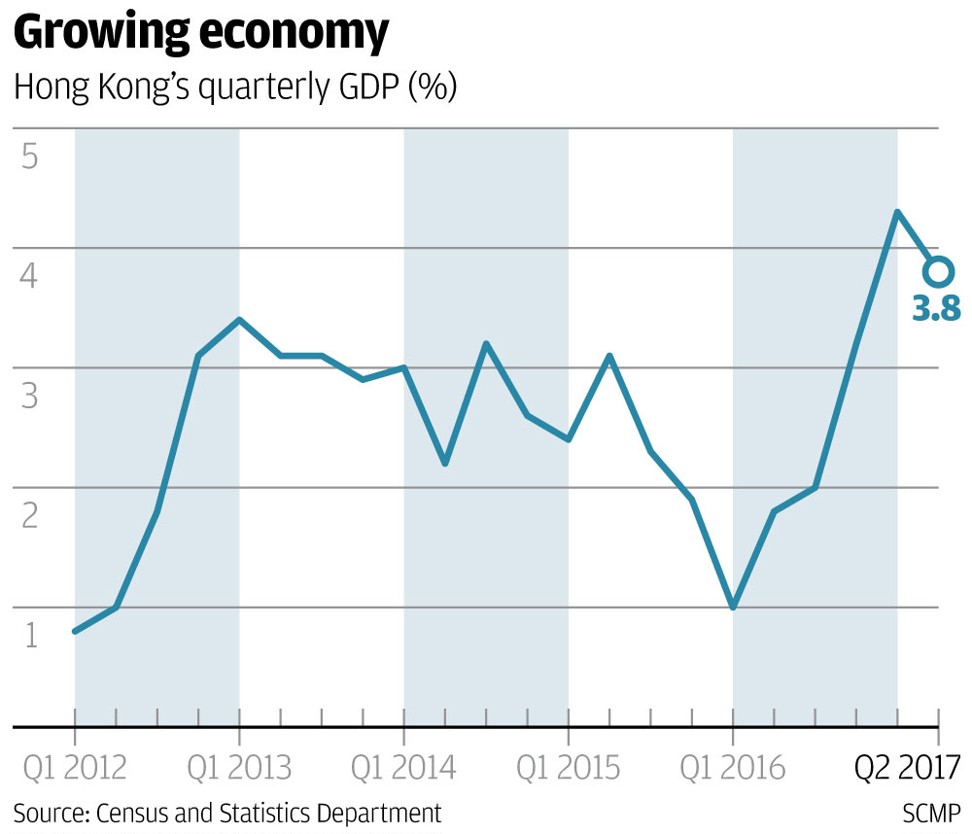
Hong Kong growth target raised 1 percentage point amid faster than expected surge
GDP in the city was up 3.8 per cent in second quarter on back of strong stock and property markets and improved global environment
The Hong Kong government upgraded the city’s full-year economic growth target on Friday after strong stock and property markets and an improved global environment propelled the economy to faster than expected growth in the second quarter of this year.
But economists warned that geopolitical tensions including intensified rhetoric between the United States and North Korea as well as the recent border dispute between China and India had cast a shadow over regional financial markets, which suffered their biggest losses of the year on Friday.
“Taking into account the stronger-than-expected actual growth outturn of 4 per cent in the first half of the year and receding downside risks in the external environment, the real GDP growth forecast for 2017 as a whole is revised upwards to 3 to 4 per cent in the current round of review, from that of 2 to 3 per cent,” deputy government economist Andrew Au Sik-hung said.
The revision is more aggressive than that indicated by finance chief Paul Chan Mo-po last month. He suggested a rise of only half a percentage point.
Au said the expansion was supported by robust domestic demand, a recovery in exports, a favourable labour market and stronger-than-expected economic growth in mainland China – the city’s biggest trade partner.
The positive developments are expected to continue to lend support to the city’s economic growth in the near future, he added.
Hong Kong set to enjoy economic tailwinds in the 2nd half, but beware of housing risks, BOCHK says
Despite the upbeat performance in the first half, Au said Hong Kong should stay alert to uncertainties such as heightened geopolitical tensions, a possible rise in protectionist sentiment and the pace of US Federal Reserve interest rate rises.
“Our current forecast is based on the condition that there is no severe deterioration in geopolitical tensions,” Au said.
But he warned that even escalating rhetoric could cause major sell-offs in markets. “We have already seen some volatility in the stock market,” Au said.
On Friday, stock markets across Asia fell after US President Donald Trump stepped up his campaign of pressure on North Korea, promising a massive response to any strike against the US or its allies.
Hong Kong stocks also registered their worst weekly decline this year, with the benchmark Hang Seng Index sliding 2 per cent or 560.49 points.
The city’s property market could also face pressures in the second half as transactions for residental units fell significantly in July and the rise in home prices slowed in the second quarter.
“Current prices are too high and there is a great chance prices might fall. People are observing,” Chinese University business school assistant dean Simon Lee Siu-po said.
The number of property transactions fell to 3,515 in July – only about half the average figure over the past 20 years, according to official statistics.
However, overall flat prices in June were still 94 per cent higher compared to the peak in 1997. The housing affordability ratio worsened to 67 per cent in the second quarter – higher than the average of 45 per cent in the past 20 years – meaning it is getting harder to buy a home in the city.
Lee said he expected US interest rate rises could also drive up home purchase costs.



